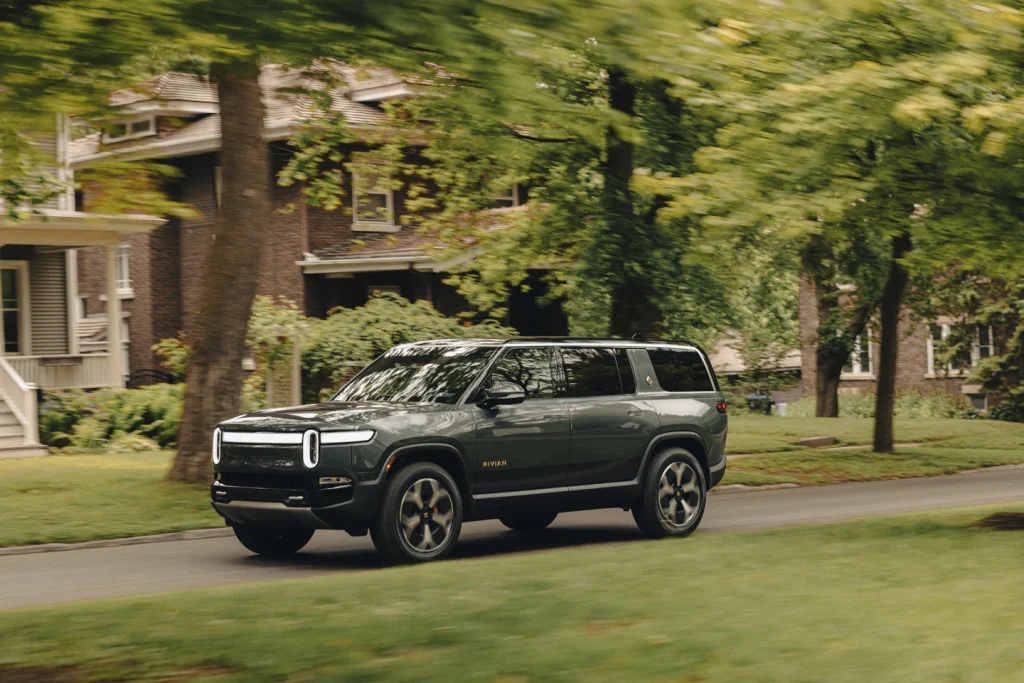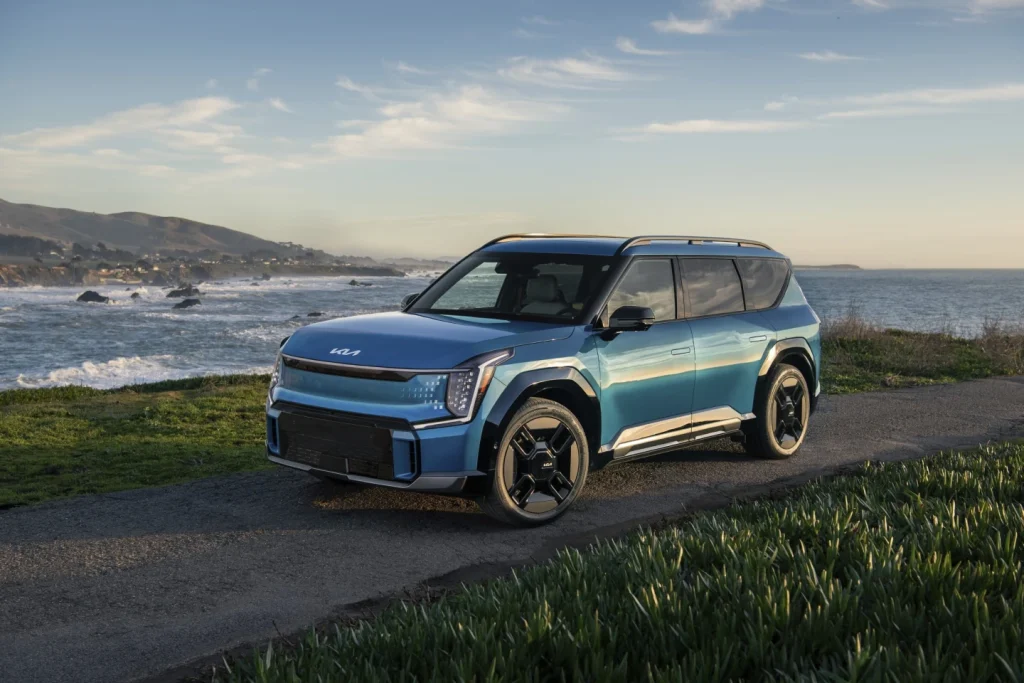Shoppers contemplating the purchase of a three-row SUV are presented with a multitude of choices, with the exception of those seeking an electric SUV.
In this particular niche, two models stand out for their promise and potential: the Kia EV9 and the Rivian R1S. The EV9 represents Kia’s latest venture into the realm of electric SUVs, akin to an electric version of the popular Kia Telluride.
On the other hand, the R1S, originating from Rivian, an electric vehicle startup, boasts significant power and exceptional off-road capabilities.
Both vehicles offer ample seating for passengers and generous cargo space, raising the question: which one is the superior option? In an effort to provide clarity, automotive experts at Edmunds have undertaken a comparative analysis of these two electric SUVs.
The EV9’s base model offers a modest EPA-estimated range of 230 miles on a full charge. However, for a slight increase in price, buyers have the option to upgrade to a model with an EPA-estimated range of 304 miles.
These models are rear-wheel-drive, but all-wheel drive variants with increased power are also available, albeit at the cost of reduced range (270-280 miles).
In a standardized real-world range test conducted by Edmunds, an EV9 model with an estimated range of 270 miles managed to cover 306 miles.
In contrast, Rivian provides a wider range of battery and electric motor configurations for the R1S. Depending on the chosen specifications, the R1S can achieve an EPA-estimated driving range of 270-400 miles.
All R1S models come equipped with all-wheel drive. In Edmunds’ testing, an R1S model surpassed its EPA estimate of 318 miles by traveling 330 miles.
For families considering an electric vehicle for road trips, charging times are just as crucial as driving range.
In tests conducted by Edmunds, the EV9 outperformed the R1S in this aspect, adding 100 miles of range in an average of 11 minutes when connected to a high-powered fast-charging station. In comparison, the R1S required an average of 19 minutes to gain the same 100 miles.
In summary, while the Rivian R1S offers a longer maximum driving range, the EV9 excels in reducing charging times during extended road trips, making the decision a close call.
Although the EV9 does not fall into the luxury SUV category, it comes equipped with premium features such as synthetic leather upholstery and heated and ventilated front seats as standard.
The vehicle also boasts an array of technological advancements, including large display screens, wireless integration with Apple CarPlay and Android Auto, and numerous standard advanced driver assistance systems.
Thanks to its plush seats and smooth ride quality, the Kia EV9 offers a level of comfort comparable to that of many luxury SUVs. Furthermore, the EV9’s three-row configuration ensures that adults can comfortably occupy all seating positions.
In conclusion, the Kia EV9 and the Rivian R1S present compelling options for consumers seeking a three-row electric SUV.
While each vehicle possesses unique strengths in terms of range, charging capabilities, comfort, and interior features, the ultimate choice between the two may come down to individual preferences and priorities.
As the electric vehicle market continues to evolve, both the EV9 and the R1S exemplify the advancements and innovations driving the industry toward a more sustainable future.
The comparison between the Rivian R1S and the Kia EV9 sheds light on the key features and attributes of these luxury SUVs.
The R1S boasts premium features such as an adjustable air suspension, wood trim, and a panoramic glass roof, along with tech features like a large 16-inch center touchscreen and a Meridian audio system.
However, it lacks smartphone integration and falls short in terms of ride quality and seat comfort compared to the EV9. Despite this, the R1S offers ample space for passengers in all three rows and impresses with its towing capacity and off-road capabilities.
On the other hand, the Kia EV9 seats six or seven passengers and provides decent cargo space, making it suitable for everyday use and weekend getaways.
With a towing capacity of up to 5,000 pounds and a range of horsepower options, the EV9 offers a balance of power and utility. Moreover, it comes at a competitive starting price, making it a value-for-money option in the electric SUV market.

In terms of pricing and value, the EV9 emerges as the winner due to its affordability and well-rounded performance. Starting at $56,395 for the short-range model, the EV9 offers a range of features and solid build quality at a reasonable price point.
On the other hand, the R1S starts at $76,700 for the base model, with the top configuration reaching $100,800. While the R1S excels in performance and off-road capabilities, its higher price may deter some buyers who prioritize value and practicality.
Ultimately, the Kia EV9 takes the lead in this comparison due to its combination of comfort, performance, and affordability.
While the Rivian R1S stands out with its distinctive styling and impressive performance, the EV9’s overall package makes it a top choice for those seeking a versatile and cost-effective electric three-row SUV.
As per Edmunds, the EV9 emerges as one of the highest-rated options in its category, showcasing its appeal to a wide range of consumers looking for a capable and reliable SUV.
